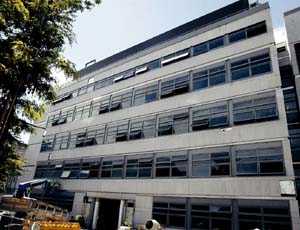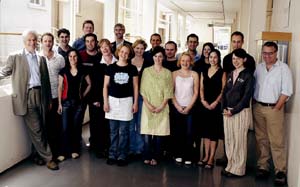| 2004 |

|
YEAR BOOK |
Trinity College Dublin
|
The changing landscape of neuroscience in Ireland
|

Key neuroscience strengths at TCIN
The themes of research at TCIN encompass molecular, cellular, degeneration, plasticity and repair, behaviour, cognition and clinical translational neuroscience. Trinity College is unique in Ireland in having a wide range of active researchers across a range of disciplines, from molecular analyses to patient management, providing a unique interdisciplinary opportunity for parallel laboratory and clinical approaches to the differing problems resulting from disorders of brain function, thus ensuring that discoveries that are made and technologies and therapies developed will change our lives in the coming decades.
TCIN's principal goal is to be the most successful interdisciplinary centre in the world studying the interplay of molecular, brain and mental processes in brain ageing and disease. TCIN has world-recognised expertise in synaptic plasticity, ageing and inflammation mediated brain disease, and novel perspectives in these areas are emerging through the uniquely interdisciplinary teamwork of TCIN.
Two of the key strategic areas where TCIN will focus are human functional brain imaging and neurogenetics. Fundamental research into the genetics of brain function is a major strength of TCIN, and the interdisciplinary ethos has manifested itself in major research projects between molecular geneticists, psychiatrists, neurologists and psychologists. Links are now being made between molecules and mental function through the collaborative work of scientific and clinical research teams using state-of-the-art technologies. The Institute will house the first high-resolution 3 Tesla MRI scanner and 7 Tesla animal imaging facilities, together with the most modern laboratories to serve scientists studying how brain cells make and break connections � the basis of all learning � and how to protect and enhance the brain's resilience against the damage of age and disease using methods as diverse as diet, pharmacology and stimulation.
The research focus of the Institute is the basic investigation of the brain on the one hand, and the application of the knowledge resulting from this investigation on the other. Education and training are very much to the fore at TCIN and, through the development of the critical research mass, ensure cutting edge undergraduate and graduate training programmes. Postdoctoral and graduate student training funded under the Programme for Research in Third Level Institutes Cycle 3 is flourishing. The first graduates have successfully completed the undergraduate degree programme in neuroscience and TCIN is developing Ireland's first structured 4-year part-taught PhD programme, which began in October 2004. TCIN was awarded one of the first two �1 million programmes of this kind by the Health Research Board.

Neuroscience Networks in Ireland
The interdisciplinary networks continue to strengthen and include neuroscientists in TCIN, UCD, UCC and RCSI, which demonstrate that Ireland has significant strengths in neuroscience research. The formation of a new society of neuroscience in Ireland affiliated with the Federated European Neuroscience Societies (FENS) demonstrates the exceptional interest in neuroscience fostered by regular meetings, which attract speakers from all over the world.
Contact: Dr Maria Fitzgibbon, Associate Director, Trinity College Institute of Neuroscience, Trinity College Dublin;
Tel: +3531 6082962; Fax: +3531 6083183;
E-mail: [email protected] ; Web: www.trinityneuroscience.com